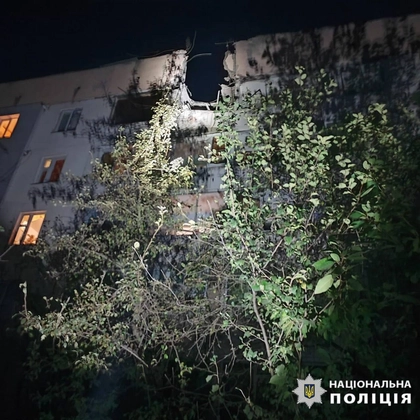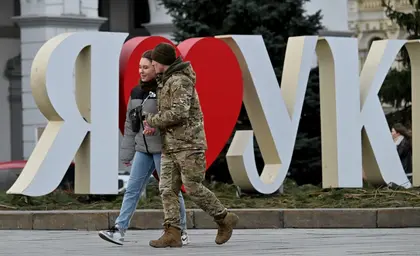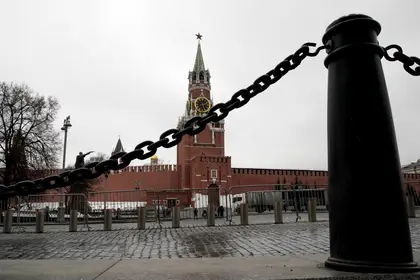The first went from civilian to military life. The second completely changed languages. The third bravely helped keep the country moving along its rail network lifeline. Not a single Ukrainian was left untouched by the Russian invasion, which started on February 24, 2022.
Three of them spoke to AFP about what they lived through, and how the war changed them.
JOIN US ON TELEGRAM
Follow our coverage of the war on the @Kyivpost_official.
- Sergiy Osachuk, governor-turned-fighter -
On the night of the invasion, then-governor Sergiy Osachuk, who had been briefed about an imminent attack, slept with one eye open.
"I was woken up by explosions and messages on my phone that Russia's full-scale attack on Ukraine had begun."
The governor of the western Chernivtsi region traded his smart business suit for military fatigues. Osachuk became lieutenant colonel of the State Border Guard Service, which in peacetime patrols Ukraine's borders. There, the 50-year-old coordinates work with other branches of the military -- and puts himself in the line of fire.
"At the moment I'm happier here than if I'd had to stay as a governor. It's a big responsibility."
Osachuk was a Ukrainian reservist when the war started and frustrated that he could not sign up straight away.
"In the first half of the year, I organised the mobilisation... in Chernivtsi. Every day I urged people to join the armed forces," he says.

Kyiv Hit by Massive Drone Attack as Russian Strikes Target Multiple Ukrainian Cities
"When my term of office came to an end on July 14, I immediately joined up. It's a big honour for me to be among the Border Guards working to get back Ukraine's borders."
Osachuk says he plans to stay in the military for as long as it takes, viewing it as his and every citizen's duty to defend Ukraine until victory is won. Speeding through Bakhmut, which Russian forces have tried to capture since last year, he says: "This is the place where the fate of both Ukraine and the free nations of the world is being decided."
- Kateryna Musienko, reconnecting through language -
Before the war, Odesa resident Kateryna Musienko spoke only Russian and even looked down on those using Ukrainian or "Surzhyk" -- a mix of the two languages.
But "everything changed" when the war started, the 24-year-old says. In March, her grandfather was killed in a Russian attack in Odesa.
"I was so overwhelmed. I didn't feel grief... only disgust and hatred for everything Russian related."
"As much as I was an aggressive Russian speaker, I became an aggressive Ukrainian speaker, without compromises, and irrevocably."
Her parents and boyfriend also transitioned to Ukrainian -- and so did a number of compatriots. Musienko advocates for the destruction of monuments to Russian poet Alexander Pushkin and changing street names linked to Russia. She has also created an NGO for the protection of the Ukrainian language.
"Language lives and develops only when it lives in everyday life," she explains. "If our children do not speak Ukrainian, the language will die."
She wants her organisation to organise "games, debates, lectures, courses, conversation clubs, festivals" and hopes that there will be a "mass movement" of people converting to Ukrainian.
"Not by force, of course, but by asking questions, reasoning," she says.
- Andriy Yeryomenko, on Ukraine's lifeline -
The war left its mark on train conductor Andriy Yeryomenko.
"My beard turned grey," jokes the 53-year-old, sitting in a train carriage in his blue uniform.
Coming from a long line of railway workers, Yeryomenko remembers the first moments of the invasion, when his team -- including his wife -- evacuated thousands of compatriots.
"People were afraid, they were all in a state of shock: children, dogs, cats, adults, old people," he tells AFP.
"We took on anyone we could. There would be 10 or 12 people in compartments meant for four."
His train would cross the vast country, sometimes with headlights switched off, carrying traumatised people to relative safety. Ukrzaliznytsia, the national rail system, kept operating even under shelling, maintaining the country afloat. Many Ukrainians have praised "hero" rail workers on social media. But Yeryomenko, whose two sons are on the battlefield, sweeps that aside.
"We simply did our job," he says, "none of us burned any tank, took down a plane or shot a Russian."
You can also highlight the text and press Ctrl + Enter






